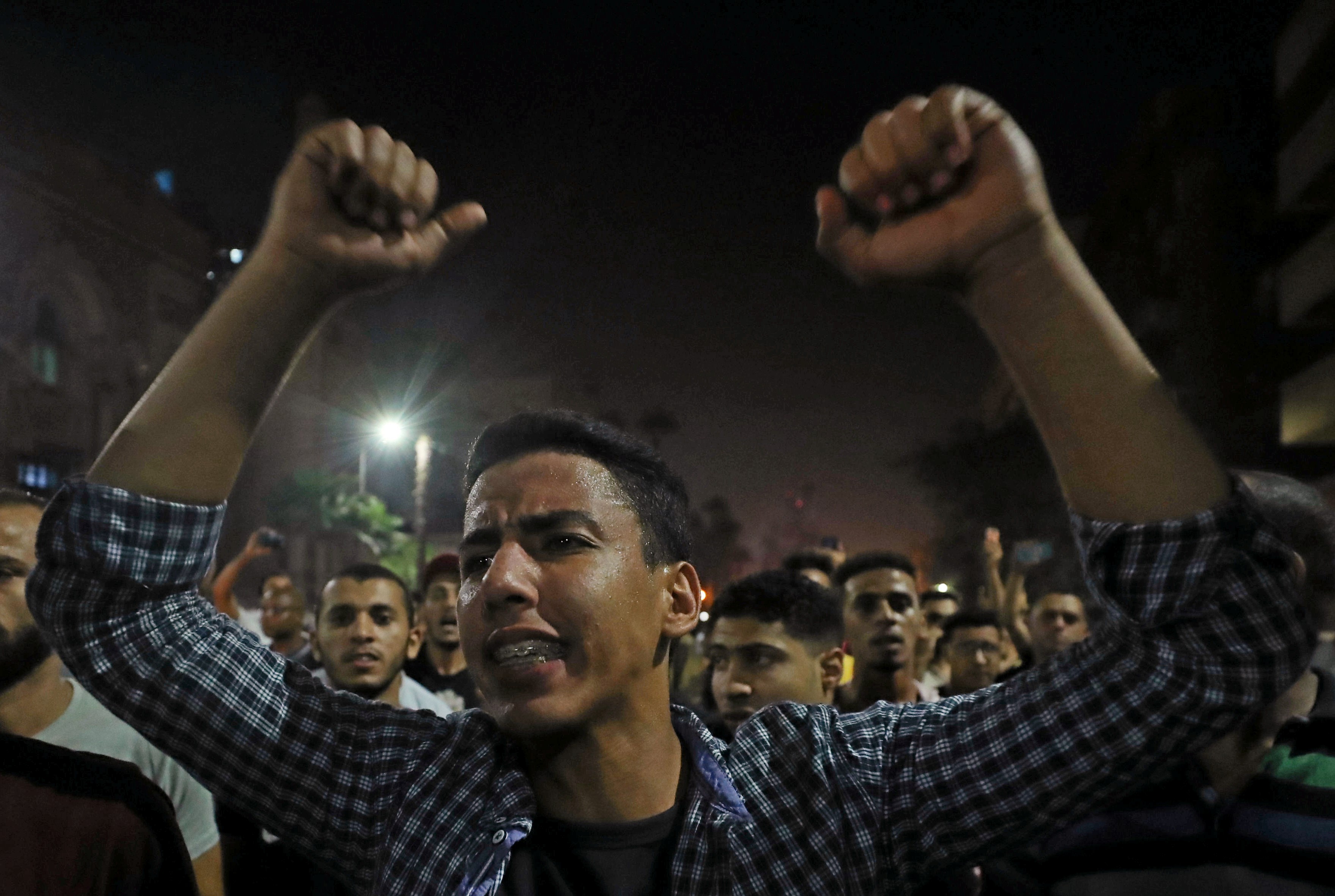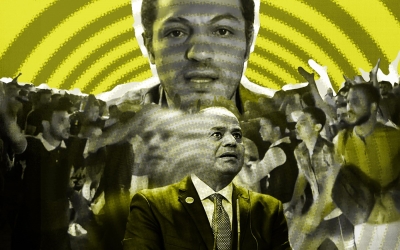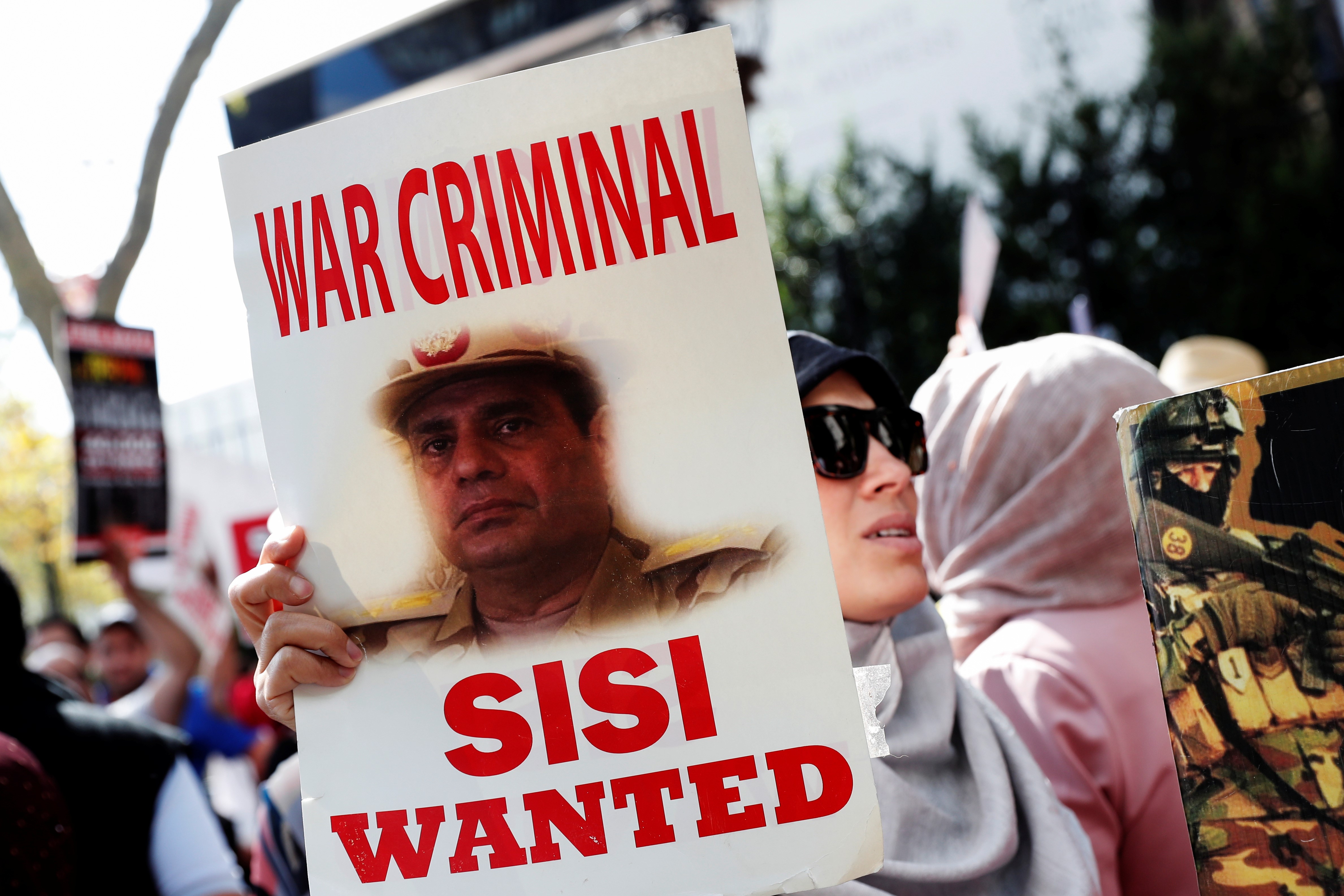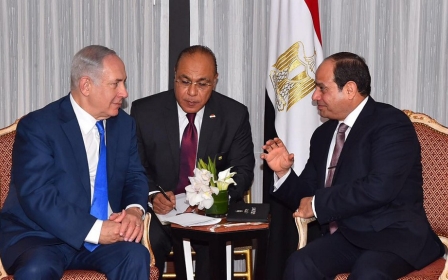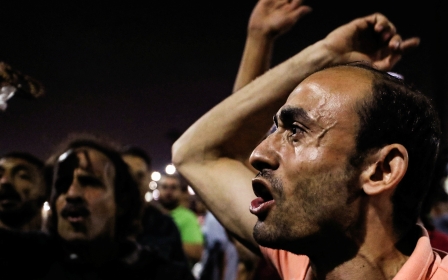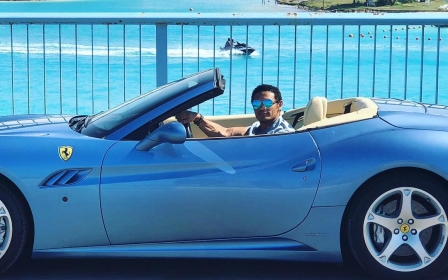Mohamed Ali's game: Why Sisi can't resist playing
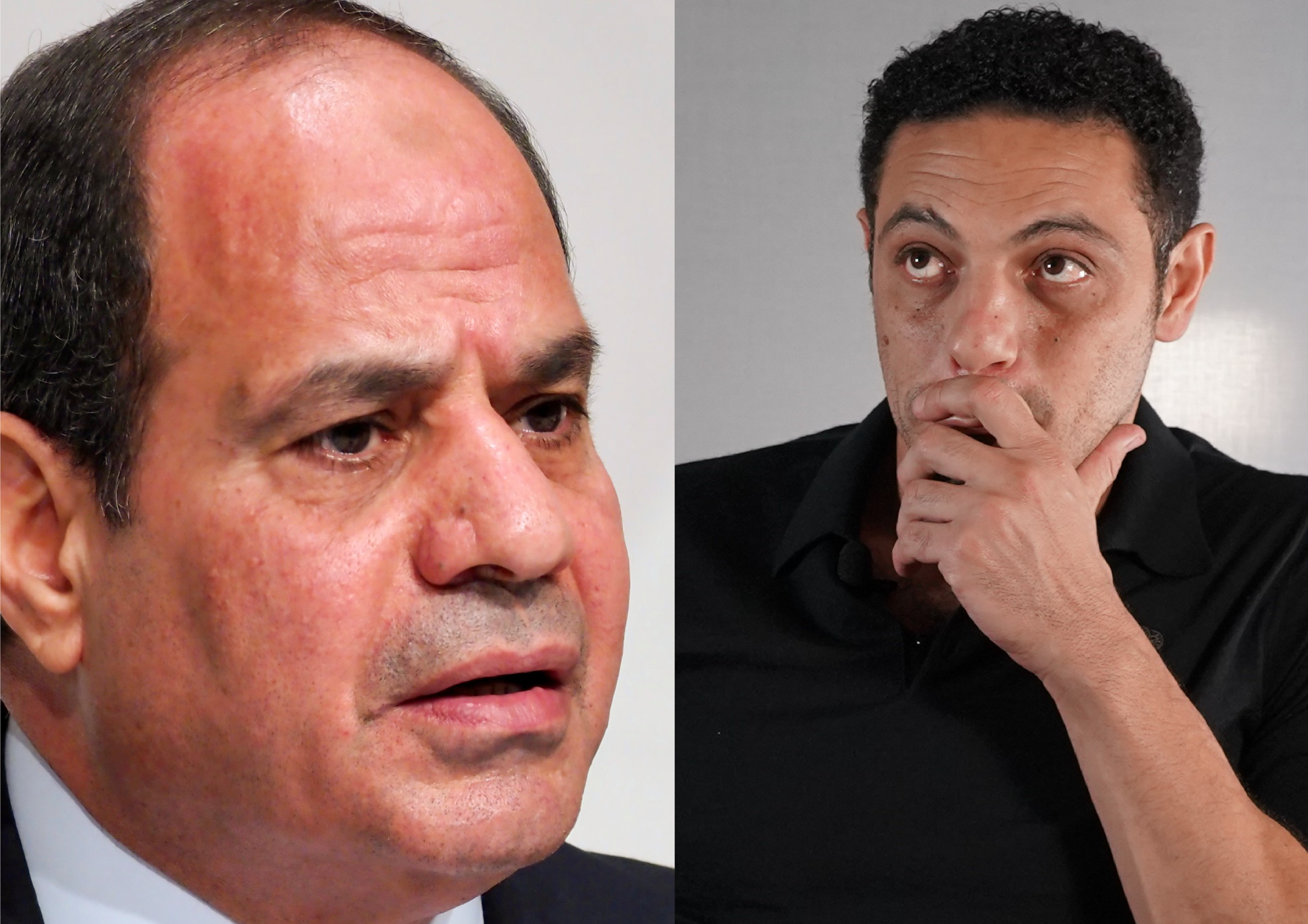
Mohamed Ali, the self-exiled Egyptian whistleblower whose anti-corruption social media videos have ignited a nascent protest movement against President Abdel Fattah el-Sisi, gave his first mainstream media interview on Tuesday.
The interview, a Middle East Eye exclusive, reflects fast-moving changes that have taken place over the past several days in Egypt.
In addition to revealing that Ali is likely aware of the need to use traditional media to advance his political cause, the interview provides further explanation of issues highlighted in the now-famous video productions, which have been viewed millions of times on social media sites.
In particular, Ali explained his intent to remove Sisi from power; the nature of threats he has received from the Egyptian government; and why, after working with the Egyptian military for 15 years, he decided recently to break away and begin speaking out against corruption.
The 'Game'
New MEE newsletter: Jerusalem Dispatch
Sign up to get the latest insights and analysis on Israel-Palestine, alongside Turkey Unpacked and other MEE newsletters
The interview was published on the same day Ali released his most recent video and just two days after Sisi delivered a speech at the "Sixth of October" war anniversary event.
Collectively, Ali’s interview, Sisi’s Sunday speech, and the most recent video release underscore the changing nature of what Ali has repeatedly referred to as the "game" he is playing with Sisi.
The "game", Ali has suggested repeatedly, involves drawing Sisi along a path paved entirely by the exiled dissident, forcing him into a defensive posture, and luring him into "surprises"
The "game", Ali has suggested, involves drawing Sisi along a path paved entirely by the exiled dissident, forcing him into a defensive posture, and luring him into "surprises".
Wittingly or unwittingly, Sisi is playing along.
In several recent public addresses, and despite never mentioning Ali by name, the Egyptian president has gone out of his way to address the corruption allegations, often in off-script, out-of-context, highly defensive fashion.
For example, several weeks ago, Sisi used his platform at the Egyptian Youth Conference to confirm, rather than deny, some of Ali’s most damning claims of corruption. Most notably, Sisi admitted to constructing several lavish presidential palaces amidst Egypt’s struggles with poverty.
The Dam Crisis
More recently, Sisi responded to Ali’s repeated challenges to address his role in perpetuating the Ethiopian dam crisis. Sisi used several minutes of Sunday’s speech to address the crisis and Ali’s allegations. He suggested he has dealt prudently with the problem.
Importantly, Sisi blamed the Egyptian people for any lost opportunities, held them solely accountable for any possible negative repercussions, and indicated that he had done nothing blameworthy.
Sisi appeared fearful, not of Ethiopia or the dam project, but of Egyptian protest and opposition to his rule
Predictably, perhaps, Sisi ignored both his prominent role in dam negotiations and repeated assurances that Egypt’s water supply would not be affected. In 2015, for instance, Sisi told Egyptians "not to worry" and that "matters are fine". In 2017, meanwhile, he said, "I assure [Egyptians], no one can touch Egypt’s water."
But Sisi’s Sunday speech was telling and important for reasons that extend well beyond the president’s predictable defence of the regime’s dam policy. Sisi appeared fearful, not of Ethiopia or the dam project, but of Egyptian protest and opposition to his rule.
He admitted to closely following Egyptian social media posts about him, and indicated he was concerned by critical remarks. In this context, he urged Egyptians to “deal with situations in a relaxed manner” and cautioned that politics must be “handled with discussion and calmness".
Counter-revolution narrative
Sisi also criticised the 2011 protest movement that led to the overthrow of longtime dictator Hosni Mubarak, even suggesting that the 2011 revolution was the ultimate cause of the nation’s water crisis.
His remarks on the revolution are significant, in part because the event was once universally viewed as something positive and heroic, and also because these remarks represent the continuation of an anti-revolution narrative he began to construct after becoming president.
On Sunday, Sisi issued perhaps his most damning condemnation of the revolution. He said: "If not for 2011, we would have had a mutually beneficial agreement for the dam… but when the nation laid itself bare [by instigating a revolution], then it became possible to do anything [harmful] to it.”
More generally, Sisi’s Sunday remarks seemed to reflect a broader concern about anti-regime protests. He explicitly linked the 20 September protests against his rule to a recent terrorist attack in Sinai, arguing that protesters and terrorists are one and the same. "They are one," Sisi said.
He also repeatedly urged Egyptians to be “united” and warned them against “protesting against the nation". The latter remark was a clear reference to last month’s protests, which caught the regime off guard and triggered a campaign of mass arrest, torture and intimidation.
It is also significant that Sisi opted to interpret the September demonstrations as protests against “the nation” rather than against him, the regime, or government corruption. This is consistent with other regime narratives suggesting that opposition to Sisi is tantamount to treason.
“If you [Egyptians] are not careful, even more will be done to you,” the Egyptian leader said.
Importantly, Sisi later cautioned explicitly against another revolution. This warning reflected earlier admonitions. In January 2018, Sisi spoke at a televised event, noting that “what happened seven or eight years ago isn’t going to happen again in Egypt."
At an autumn 2018 conference, Sisi said that "2011 was incorrect treatment for an incorrect diagnosis".
The bigger picture
Ali’s accusations have meaningfully impacted the regime. Not only has Sisi and his media apparatus been forced to devote significant time addressing Ali’s allegations, but the regime has also felt compelled, apparently, to respond in even more tangible ways.
Sisi has employed a two-pronged strategy involving concession and intimidation. The regime made multiple concessions earlier this month, including lowering the price of fuel.
Meanwhile, it has responded with its typical brand of authoritarian brutality. More than 2,300 people - including children, human rights lawyers, journalists and politicians - have been arrested.
Ali, meanwhile, has adjusted his tactics to conditions on the ground.
Ali has succeeded, rather remarkably, in bringing Egyptians back into the fold of politics
His initial videos spoke of a quick-strike and suggested that Sisi’s demise might be imminent. Now, Ali suggests he is playing a long-form "game" with Sisi, which will ultimately end with Sisi’s removal, even if “victory” takes many months.
Significantly, Ali’s tone toward the Muslim Brotherhood, one of Egypt’s most feared opposition groups, has also changed recently. Early videos were highly critical of the Brotherhood, with Ali going out of his way to note he wasn’t a sympathiser and arguing that Islamists should not be allowed to rule Egypt.
More recently, though, Ali has struck a more sympathetic tone toward both late former president Mohamed Morsi, who hailed from the Brotherhood, and the Islamist movement as a whole.
Recent videos have argued passionately that the Brotherhood is not a terrorist group and that its members are an essential part of Egyptian society. Ali’s change in tone could be the product of a realisation that his cause is unlikely to succeed without Brotherhood support.
Going forward
To date, Ali has succeeded, rather remarkably, in bringing Egyptians back into the fold of politics.
Only weeks ago, Egyptian politics seemed dead, buried under one of the harshest authoritarian regimes - and worst human rights violators - in the world. Few could have predicted mass street protests against Sisi so soon after he won another sham election and amended the constitution to further cement his rule.
Perhaps most importantly, though, Ali has succeeded in bringing diverse, scattered, feuding Egyptians together under the banner of opposition to the president. Egyptians who have otherwise disliked each other for more than six years are now united under a single anti-Sisi banner.
Undoubtedly, Sisi recognises his dwindling popularity and knows that millions of Egyptians oppose him. He also knows that, for now, he can’t prevent Ali from releasing videos or Egyptians from watching them. The game, then, will continue, whether Sisi wants to play or not.
We’ve known for years that Sisi plays effective authoritarian offense. We’ll find out in the coming weeks and months how strong his defence against popular opposition can be.
The views expressed in this article belong to the author and do not necessarily reflect the editorial policy of Middle East Eye.
Middle East Eye delivers independent and unrivalled coverage and analysis of the Middle East, North Africa and beyond. To learn more about republishing this content and the associated fees, please fill out this form. More about MEE can be found here.



